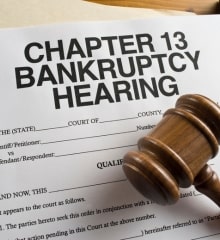How Much Cash Can You Keep When Filing Chapter 7?

One of the first things people ask us at DebtStoppers sounds simple but carries a lot of worry behind it: “If I file for bankruptcy, will they take all my money?”We hear that almost every day. And it makes sense because when you’ve worked your whole life to save even a little bit, the idea of losing it feels unfair. The truth is, bankruptcy law doesn’t want to strip you bare. It’s meant to give you a real chance to start over, not to punish you for being broke.
So let’s talk about how much cash you can keep when filing Chapter 7, how it actually works, and what it looks like here in Texas.
How does the cash exemption in Chapter 7 actually work?
When you file for Chapter 7 bankruptcy, everything you own goes into what’s called the “bankruptcy estate.” Don’t let that phrase scare you; it just means the court reviews your assets to decide what can be protected.
The good news is that there are cash exemptions in Chapter 7 that let you keep part, sometimes all, of your money. These exemptions exist so you can still cover basic needs like rent, groceries, or gas to get to work.
Here’s how it works in plain language. The law draws a line between what you need and what you could give up to pay creditors. The “needed” portion, called exempt assets, is yours to keep.
When you sit down with a bankruptcy attorney, they’ll walk you through that line because it’s different for everyone. For some, a few hundred dollars makes a big difference. For others, it’s a few thousand.
How much cash is exempt in Chapter 7 in Texas, and how do federal rules compare?
This part confuses a lot of people. Texas actually gives you two choices. You can use either Texas exemptions or federal exemptions, but not both.
Under Texas law, you don’t have a specific “cash limit.” Instead, there’s something called the personal property exemption. It protects up to $50,000 for an individual or $100,000 for a family. That covers everything from furniture and clothes to jewelry, tools, and yes, your cash. So, in practice, how much cash is exempt in Chapter 7 Texas depends on how much of that total is used for your other property.
If you go with the federal system, it’s a bit stricter. There’s a standard “wildcard” exemption of about $1,475 in cash, plus any leftover homestead exemption that can add roughly $13,000–$15,000. Those amounts get adjusted every few years.
In simple terms, Texans tend to prefer the state option because it’s more flexible. If you’re filing in Texas, you usually get to keep more of your money and belongings.
We’ve had clients who were shocked when they found out they could actually keep their savings. One woman in Dallas had just over $4,000 in her account when she filed. She thought she’d lose it all, but with the Texas exemptions, every dollar stayed right where it was in her bank.

What happens if you exceed the cash exemption in Chapter 7?
Here’s where timing and planning make all the difference. Let’s say you have more cash than what’s exempt. Maybe you’ve been saving up for a home repair or you just got your tax refund. What happens then?
Technically, the bankruptcy trustee could ask you to turn over the amount above the exemption. But in real life, that doesn’t usually mean someone knocks on your door asking for cash. Most of the time, it’s handled through paperwork. Sometimes, we can help you spend that money before filing on necessary things like rent, car maintenance, or medical bills, so it’s not just sitting there unprotected.
That’s why it’s so important to talk to a lawyer before you file. We’ve seen people rush into filing without advice and lose money they didn’t have to. A short conversation with a bankruptcy attorney can make the difference between keeping or losing your savings.
Can joint filers keep more cash when filing Chapter 7 together?
Yes, they can. Married couples who file together usually get to double their exemptions. That means a family could protect up to $100,000 in personal property under Texas law. Under federal law, each spouse gets their own set of exemptions too.
Of course, it has to be handled correctly. The court looks at who owns what, and joint bank accounts need to be documented properly. But done right, filing together often gives couples a stronger safety net.
We recently worked with a couple in Fort Worth who had about $9,000 saved up. They thought it was gone for good. After filing jointly and using Texas exemptions, they kept every cent.
Do bank accounts and cash savings count toward your exemption total?
Yes. Anything you can access easily counts as “cash.” That includes checking and savings accounts, physical cash, and even prepaid debit cards. If you can spend it tomorrow, it’s part of your exemption calculation.
A lot of folks think if they withdraw the money and keep it at home, it doesn’t count. But the truth is, it still does. You must report everything when filing Chapter 7. Trying to hide cash, even with good intentions, can land you in serious trouble. It’s always better to be upfront and plan correctly.
One thing we do at DebtStoppers is help clients legally reposition their money before filing. Paying overdue bills, fixing your car, or stocking up on household items are all acceptable ways to use cash without losing it. It’s about being smart, not sneaky.
What steps should you take before filing Chapter 7 to protect your cash?
If you’re thinking about filing Chapter 7, take a deep breath. Then take these steps before moving forward.
First, get everything on paper. Every account, every balance, every bill. Second, figure out which exemption system works best for you. That’s where professional guidance helps the most. Texas is generous, but it’s also detailed, and one wrong form can cost you thousands.
Third, use your money wisely. Pay the bills that matter, like your rent, utilities, and medical needs. Avoid large cash withdrawals or gifts to family members before filing. Those look suspicious to the court.
We often tell clients that it’s not about spending your money, it’s about spending it responsibly so it’s protected.

How can a bankruptcy attorney help you understand the cash exemption in Chapter 7?
Bankruptcy law is a world of exceptions, deadlines, and paperwork. It’s easy to get lost in it all, and losing even a small amount of savings can feel devastating. That’s where having an experienced bankruptcy attorney changes everything.
At DebtStoppers, we’ve spent years helping Texans protect what matters most. We don’t just file cases; we strategize around your specific situation. We’ll show you how to apply the exemptions, what to spend before filing, and how to make sure you keep as much of your cash as possible.
One of our clients once said after her discharge, “I thought bankruptcy meant losing everything, but it ended up saving my future.” That’s what we want for everyone who walks through our door: clarity, stability, and a clean start.
A Fresh Start Is Closer Than You Think
So, how much cash can you keep when filing Chapter 7? Enough to move forward. Enough to stay on your feet. The system isn’t there to punish you; it’s there to help you rebuild.
If you’re staring at your bank balance and wondering whether it’s safe, don’t guess. Get real advice. At DebtStoppers, we’ll walk you through your options, calculate your exemptions, and make sure you don’t lose a single dollar more than the law requires.
Call today for a free consultation with one of our experienced attorneys. We’ll help you understand your rights, protect your cash, and start writing the next chapter of your financial story, one built on freedom, not fear.





